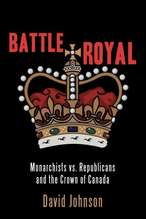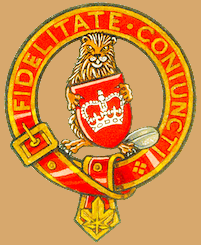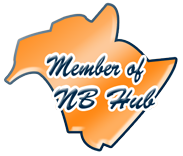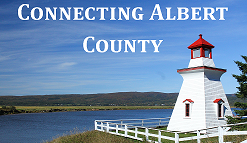 Book Cover
Book Cover where you are not the intended audience.
Either it will end up seeming too technical, too simple, or simply full of information
you already know. Battle Royal written by
David Johnson avoids the first two pitfalls
but toes the line on the third one for me.
It is nonetheless an interesting look at the
monarchist vs. republican debate in
Canada and the future of the Canadian
Crown. First, a look at the book's layout.
| Author: David Johnson Publisher: Dundurn Press Published: January, 2018 Page Count: 288 Price: $26.99 | The book begins with a brief look at the history of the Crown from the Royal Proclamation of 1763 to Canadian Confederation in 1867. This takes up the first two chapters and gave me several interesting anecdotes. |
'Crown' and the various offices connected to the monarchy.
Chapters four and five return to recounting history to explain
why the monarch is largely limited to 'soft power' and the
remaining bits of 'hard power' that are still a prerogative of
Crown. This includes an examination of the Prorogation Crisis
of 2008. Throughout the chapters mentioned both republican
and monarchist arguments are given in what I would call an
even-handed manner (although, throughout I think the
author gave the republican arguments too much credit though
republicans would likely say the same for the monarchist
arguments).
Chapter six looks at the alternative to monarchy (republic). It
is a fair overview of the history of republicanism. It includes
a good run-down of the dangers the monarchy faced in the
1970s as well as more indirect challenges in the 80s and 90s.
It also includes a good overview of public opinion polls up to
the present day.
Chapters seven and eight deal with the debate between the
republicans and monarchists with chapter seven dealing with
the monarchy as an institution and chapter eight having
more to do with the Royal Family. This is not a comfortable
read for a monarchist but arguably a necessary one. It is
important to know what your enemy's arguments are after
all. By this point David Johnson has asked open ended
questions in every chapter (not a style choice I really liked but
whatever) and it is here they start to be answered.
Chapter nine is where republics would likely shed salty, salty
tears as it deals with the constitutional hurdles of reforming
the monarchy. Not only does it explain the hurdles it looks at
every argument and plan republicans have made to overcome
or by-pass them and reveals them to be pure folly built on
ignorance and desperation. It is a beautiful chapter.
Chapter ten looks at the beginning of the future King Charles
III's reign. One prediction has already come true: Charles will
be the next Head of the Commonwealth. But while the various
speculations are fun there is a serious question asked (and
one of the few really interesting ones in the book):
"Are we destined to have to live with some of the worst fears of both republicans
and monarchists? That is, are we stuck with an ineradicable monarchy that most
Canadians view as virtually useless, a meaningless yet embarrassing ornamental
bauble that we would and should discard if we could but we can't? Or can we
aspire to something better? If we know the monarchy will continue in this country,
can we have a better monarchy?"
title as a 'pragmatic monarchist' and dispelled my lingering
suspicion he might be a crypto-republican. The proposals are
ambitious, but doable if there is the political and royal will.
Overall, I found the last few chapters much more useful than
the entire rest of the book. But that is mostly because I was
aware of most of the information up to chapter eight. But it is
still nice to have the full set of facts and arguments in one
place. The book has an extensive bibliography and is scholarly
without being dry. Overall opinion: Its a decent little book.
Loyally Yours,
A Kisaragi Colour
 RSS Feed
RSS Feed





